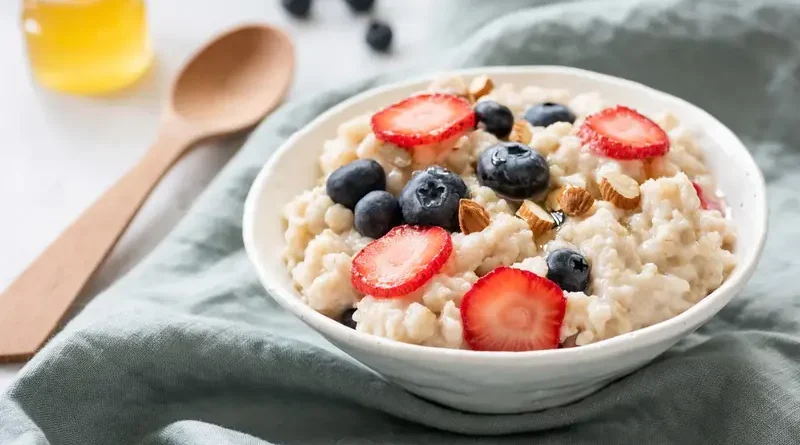Is Oatmeal Healthy? Uncovering the Truth Behind Its Versatility
For many people, oatmeal is a go-to breakfast choice because of its supposed health advantages. But with all the excitement, certain queries remain: Is oatmeal healthy? In this piece, we examine the nutritional value of oatmeal and discuss some possible health benefits. Come along as we explore if oatmeal merits its reputation as a breakfast superstar and peel back the layers of the hoopla around it.
Nutritional Profile of Oatmeal
| Nutrition | Facts |
|---|---|
| Calories | 140 |
| Fat | 2.5 g |
| Sodium | 0 mg |
| Carbohydrates | 28 g |
| Fiber | 4 g |
| Sugars | 0 g |
| Protein | 5 g |
Health Benefits of Oatmeal Consumption
Numerous health advantages of oatmeal include:
Heart Health:
Soluble fiber from oatmeal lowers low-density lipoprotein (LDL) cholesterol and lowers heart disease risk.
Blood Sugar Control:
It is good for managing diabetes because of its high fiber content and low glycemic index, which moderate blood sugar levels.
Digestive Health:
The fiber in oatmeal promotes regular bowel movements and a balanced microbiome in the gut.
Weight Management:
Its filling qualities and fiber contentment encourage feeling full, which helps with weight loss or maintenance.
Antioxidant Properties:
Antioxidants included in oatmeal can lessen inflammation and potentially reduce the chance of developing chronic illnesses.
Impact of Oatmeal on Heart Health
Because oatmeal can lower LDL cholesterol levels—also referred to as the “bad” cholesterol—it is a heart healthy diet food choice. Oatmeal’s soluble fiber beta-glucan helps the body eliminate cholesterol, lowering the risk of cardiovascular illnesses like heart attacks and strokes. It does this by forming a gel-like substance in the digestive tract.
Oatmeal is a beneficial complement to a heart-healthy diet since it may also help lower blood pressure, reduce inflammation, and promote overall cardiovascular health.
Incorporating Oatmeal into a Balanced Diet
Along with providing variety and taste to your meals, including oatmeal in your diet as part of a balanced meal plan can have several positive health effects. Here’s how to incorporate oatmeal into your diet regularly:
Breakfast Options:
A traditional breakfast option, oatmeal can be made in a variety of ways to suit your tastes. To add taste and nutrition, start your day with a warm bowl of oatmeal topped with fruits, healthy nuts, and seeds, or with a drizzle of honey or maple syrup. For a gratifying and nutritious breakfast alternative, you can also experiment with savory oatmeal recipes by adding veggies, eggs, cheese, or herbs.
Snack Ideas:
In between meals, oatmeal can be a wholesome snack that helps keep you full and energized. For a quick and portable snack, make oatmeal cookies, bars, or energy balls with rolled oats, almonds, dried fruit, and other healthy ingredients. For a quick and satisfying on-the-go snack, you can also blend oats with fruits, yogurt, milk, and your preferred flavorings to create oatmeal-based smoothies.
Baking and Cooking:
A versatile ingredient that may be used for baking and cooking, oatmeal can enhance the texture, flavor, and nutritional value of many different foods. To boost the nutritional profile and fiber content of baked goods like muffins, bread, healthy pancakes, and waffles, replace a portion of the flour in recipes with ground oats or oat flour. Oats can also be used as a crispy garnish for fruit crisps, crumbles, and casseroles to add taste and texture.
Dessert Options:
You may turn oatmeal into sweet treats that will fulfill your sweet appetite and give you essential nutrients. Make oatmeal-based crisps, cobblers, or puddings with oats, fruits, spices, and sweeteners for a flavorful, high-fiber, guilt-free treat. For a nutritious and delectable treat, you may also make your own granola or granola bars with oats, almonds, seeds, and dried fruits.
Customization and Variety:
Oatmeal’s adaptability to a variety of tastes and preferences is one of its best qualities. Try a variety of oat varieties, including steel-cut, rolled, and quick oats, to determine which texture and cooking time works best for you. You may make countless permutations by combining different toppings, flavorings, and add-ins to keep your meals exciting and fun.
Oatmeal and Digestive Health
One of the best foods for supporting digestive health is oatmeal. Its high fiber content helps to maintain regular bowel motions and stave off constipation, especially soluble fiber like beta-glucan. Oatmeal also functions as a prebiotic, feeding good intestinal flora that supports a balanced microbiome. Oatmeal is a beneficial addition to your diet for preserving gut health and healthy digestive function because of these qualities.
Role of Oatmeal in Weight Management
Because of its high fiber content, which increases feelings of fullness and satiety and helps regulate appetite and lower calorie intake, oatmeal is a helpful weight management ally.
Due to its versatility, it may be used for a wide range of fulfilling meal and snack options, and its low glycemic index helps to reduce blood sugar increases. You may eat tasty, nutrient-dense meals and support your weight control objectives by including oatmeal in your diet.
Conclusion
In summary, oatmeal proves to be a nutrient-dense superfood with a host of health advantages. Because of its high fiber content, which lowers LDL cholesterol and stabilizes blood sugar, it is a great complement to a diet that promotes heart health. In addition to supporting healthy digestion and weight management, oatmeal can be used for a variety of meals, including breakfast and dessert.
Oatmeal justly deserves its reputation as a breakfast superstar because of its rich nutritional profile and adaptability, which offer taste and nourishment to promote general health and well-being.
You Can Read More About Oatmeal
Delight Your Taste Buds with Easy Irresistible Oatmeal Cookies
Eating Chia Seed Oatmeal: How to Boost Your Fiber Intake?
Amazing Facts: Add Ground Chia Seeds to Your Morning Oatmeal
